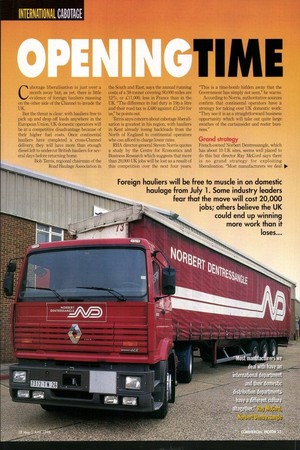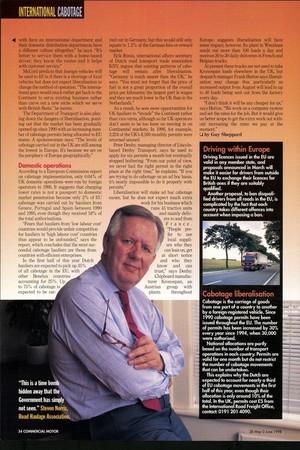Cabotage liberalisation is just over a month away but, as
Page 37

Page 38

If you've noticed an error in this article please click here to report it so we can fix it.
yet, there is little evidence of foreign hauliers massing on the other side of the Channel to invade the UK.
But the threat is clear: with hauliers free to pick up and drop off loads anywhere in the European Union, UK domestic operators will be at a competitive disadvantage because of their higher fuel costs. Once continental hauliers have completed a cross-Channel delivery, they will have more than enough diesel left to undercut British hauliers for several days before returning home.
Bob Terris, regional chairman of the Road Haulage Association in the South and East, says the annual running. costs of a 38-tonner covering 90,000 miles are 12%, or £11,000, less in France than in the UK. "The difference in fuel duty is 19p a litre and their road tax is £480 against £3,210 for us," he points out.
Terris says concern about cabotage liberalisation is greatest in his region, with hauliers in Kent already losing backloads from the North of England to continental operators who can afford to charge lower rates.
RHA director-general Steven Norris quotes a study by the Centre for Economics and Business Research which suggests that more than 20,000 UK jobs will be lost as a result of this competition over the next four years. "This is a time-bomb hidden away that the Government has simply not seen," he warns.
According to Norris, authoritative sources confirm that continental operators have a strategy for taking over UK domestic work: "They see it is as a straightforward business opportunity which will take out quite large swathes of the curtainsider and reefer business."
Grand strategy French-owned Norbert Dentressangle, which has about 10 UK sites, seems well placed to do this but director Ray McCord says there is no grand strategy for exploiting liberalisation. "Most manufacturers we deal with have an international department and their domestic distribution departments have a different culture altogether," he says. "It's better to service them with a home-based driver; they know the routes and it helps with customer service."
McCord predicts that foreign vehicles will be used to fill in if there is a shortage of local vehicles but does not expect liberalisation to change the method of operation. "The international guys would much rather get back to the Continent to serve existing business rather than carve out a new niche which we serve with British fleets," he insists.
The Department of Transport is also playing down the dangers of liberalisation, pointing out that the market has been gradually opened up since 1990 with an increasing number of cabotage permits being allocated to EU states. A spokeswoman says: "The levels of cabotage carried out in the UK are still among the lowest in Europe. It's because we are on the periphery of Europe geographically" Domestic operations According to a European Commission report on cabotage implementation, only 0.04% of UK domestic operations were run by foreign operators in 1996. It suggests that charging lower rates is not a passport to domestic market penetration because only 2% of EU cabotage was carried out by hauliers from Greece, Portugal and Spain between 1990 and 1995, even though they received 18% of the total authorisations.
"Fears that hauliers from low labour cost' countries would provide unfair competition for hauliers in 'high labour cost' countries thus appear to be unfounded," says the report, which concludes that the most successful cabotage hauliers are those from countries with efficient enterprises.
In the first half of this year Dutch hauliers are expected to pick up 35% of all cabotage in the EU, with other Benelux countries accounting for 25%. Up to 75% of cabotage is expected to be car ried out in Germany, but this would still only equate to 1.3% of the German hire-or-reward market.
Erik Runia, international affairs secretary of Dutch road transport trade association KNV, argues that existing patterns of cabotage will remain after liberalisation. "Germany is much nearer than the UK," he says. "You must not forget that the price of fuel is not a great proportion of the overall price per kilometre; the largest part is wages and they are much lower in the UK than in the Netherlands."
As a result, he sees more opportunities for UK hauliers to "invade" the Continent rather than vice-versa, although so far UK operators don't seem to be too keen on moving in on Continental markets. In 1996, for example, 2,224 of the UK's 8,160 monthly permits were returned unused.
Peter Denby, managing director of Lincolnbased Denby Transport, says he used to apply for six permits a month but eventually stopped bothering. "From our point of view, we never had the right permit in the right place at the right time," he explains. "If you are trying to do cabotage on an ad hoc basis, it's nearly impossible to do it properly with permits."
Liberalisation will make ad hoc cabotage easier, but he does not expect much extra work for his business which runs 43 tractive units and mainly delivers to and from France. "People prefer to use local suppliers who they can lean on, get at short notice and who they know and can trust," says Denby. Chipboard manufac turer Kronospan, an Austrian group with plants throughout Europe, suggests liberalisation will have some impact, however. Its plant in Wrexham sends out more than 100 loads a day and receives 20 to 30 daily deliveries in French and Belgian trucks.
At present these trucks are not used to take Kronospan loads elsewhere in the UK, but despatch manager Frank Hatton says liberalisation may change this, particularly as increased output from August will lead to up to 40 loads being sent out from the factory every day.
"I don't think it will be any cheaper for us," says Hatton. "We work on a computer system and set the rates for the job. But it would give us better scope to get the extra work out without increasing the rates we pay at the moment" Li by Guy Sheppard Driving within Europe Driving licences issued in the EU are valid in any member state, and proposals announced in March will make it easier for drivers from outside the EU to exchange their licences for British ones if they are suitably qualified.
Another proposal, to ban disqualified drivers from all roads in the EU, is complicated by the fact that each country takes different offences into account when imposing a ban.
Cabotage liberalisation Cabotage is the carriage of goods from one part of a country to another by a foreign-registered vehicle. Since 1990 cabotage permits have been issued throughout the EU. The number of permits has been increased by 30% every year since 1994, when 30,000 were authorised.
National allocations are partly based on the number of transport operations in each country. Permits are valid for one month but do not restrict the number of cabotage movements that can be undertaken.
This explains why the Dutch are expected to account for nearly a third of EU cabotage movements in the first half of this year, even though their allocation is only around 10% of the total. In the UK, permits cost E5 from the International Road Freight Office, contact: 0191 201 4090.






















































































































